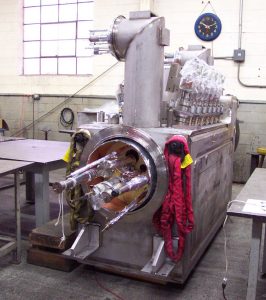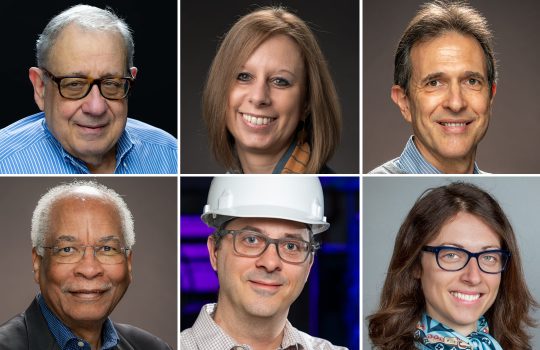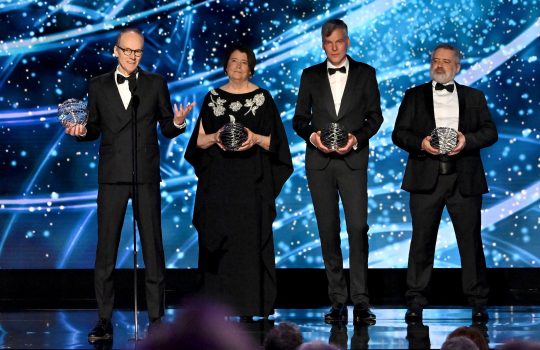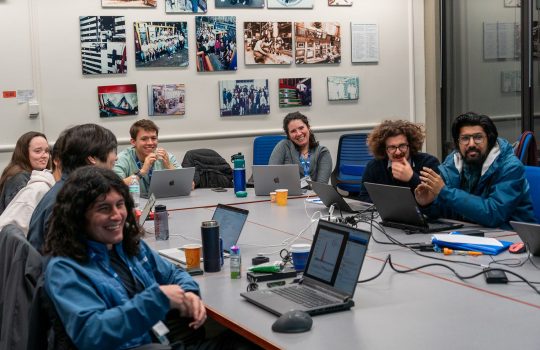BATAVIA, Ill. – Officials of the of the U.S. Department of Energy’s Fermi National Accelerator Laboratory and Lawrence Berkeley National Laboratory (Berkeley Lab) announced yesterday (Wednesday) the completion of a key component of the U.S. contribution to the Large Hadron Collider, a particle accelerator under construction at CERN, in Geneva, Switzerland. After a competitive bid process, Berkeley Lab awarded Meyer Tool and Manufacturing, a woman-owned small business in Oak Lawn, Illinois, the contract to manufacture eight cryogenic distribution boxes, components of the cooling system for the new accelerator, which is due to begin operating in 2007. Meyer Tool has successfully completed the first box.
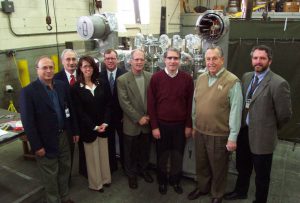
Left to Right: Joseph Rasson (Berkeley Lab), Bruce Strauss (DOE-Office of High Energy Physics), Eileen Cunningham (Meyer Tool), Jim Brosnahan (IL State Representative), Tom Peterson (Fermilab), Phil Pfund (Fermilab), Frank Meyer (President Meyer Tool) and Jim Kerby (Fermilab) stand in front of the first completed distribution box.
“Meyer Tool has an excellent working relationship with Fermilab and Berkeley Lab,” said Bruce Strauss, U.S. LHC Accelerator Program Manager in the DOE’s Office of High Energy Physics, who visited Meyer Tool yesterday morning to celebrate the completion of the first box. “Since its inception, Fermilab has always supported and utilized the great number of machine shops and small manufacturing businesses that are in the Chicago area. Because of the success that we are seeing today, we have confidence that Meyer will deliver the remainder of the boxes on schedule and on budget.”
Berkeley Lab engineer and project manager Joseph Rasson noted the significance of the achievement. “This is a critical milestone,” Rasson said, “And it sets a perfect model of DOE labs working together with a small business to design and build one-of-a-kind hardware.”
The distribution boxes will connect the LHC’s superconducting magnets with the systems that keep the magnets operating at temperatures near absolute zero. The distribution boxes supply cryogens in the form of liquid and gaseous helium, and deliver power to the magnets.
“It is very tricky getting power from room temperature to a cryogenic temperature near absolute zero,” said Fermilab cryogenics engineer Tom Peterson, who worked closely with Meyer Tool. “Accelerators with cryogenics or superconducting magnets use distribution boxes to supply cryogens for the cold devices. You need to have the right interface between the magnets and the other components of the accelerator in order to get the power from room temperature down to 2 Kelvin. These boxes will do the job.”
While Fermilab provided the technical oversight for the project, Berkeley Lab designed the distribution boxes and contracted with Meyer Tool. Although Meyer Tool is fabricating most components of the 13,000 lb. boxes, both Fermilab and Berkeley Lab fabricated several of their components. Fermilab and KEK, a Japanese particle physics laboratory, manufactured the quadrupole magnets, and Brookhaven National Laboratory fabricated the dipole magnets, that will both be connected to the distribution boxes when all the pieces come together in Geneva.
“All our employees at Meyer Tool take great pride in our work, especially the critical components and complex assemblies we manufacture for the DOE and the National Laboratories,” said Ed Bonnema, VP Operations for Meyer Tool. “We work as a team to meet the difficult and exacting specification requirements associated with these types of projects. Today, as a result of this exceptional collaboration, we have the first of the distribution boxes complete, with three more on assembly stands.”
In unique partnership among two national labs and a small local business, Fermilab, Berkeley Lab and Meyer Tool started working on the distribution boxes in April 2003. Meyer Tool will ship the first two distribution boxes to CERN in January. Fermilab, Berkeley Lab and Meyer Tool plan to have all eight boxes completed by September 2005.
Founded in 1969, Meyer Tool has manufactured equipment for major scientific laboratories, including Fermilab, Argonne National Laboratory, Jefferson Laboratory, Brookhaven National Laboratory, Lawrence Livermore National Laboratory and Oak Ridge National Laboratory.
The eight distribution boxes represent a portion of the $531 million total U.S. contribution to the LHC machine and detectors. “The distribution boxes are one of the last portions of the US-LHC project to be completed,” said Fermilab engineer Jim Kerby, US-LHC Accelerator Project Manager. “The accelerators won’t work without them.”
Fermilab is a DOE Office of Science national laboratory, operated under contract by Universities Research Association, Inc.
Related Web sites:
Fermilab: http://www.fnal.gov
CERN: http://public.web.cern.ch/Public/
Lawrence Berkeley National Laboratory: http://www.lbl.gov/

